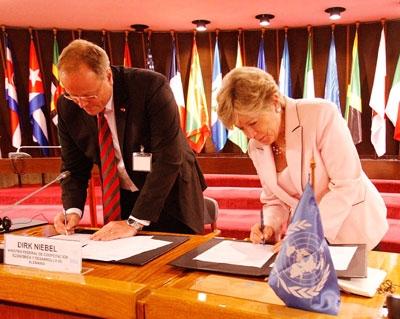Press Release
(9 January 2012) "Tax reforms with a vision of sustainable development are needed in Latin America and the Caribbean. Tax collection and public expenditure structures must be revised so that they are fairer and have the necessary resources to face the challenges of development and climate change," said the Executive Secretary of the Economic Commission for Latin America and the Caribbean (ECLAC), Alicia Bárcena, today.
The high representative and the Federal Minister for Economic Cooperation and Development of Germany (BMZ), Dirk Niebel, took part in a roundtable on "Opportunities and challenges of climate change for the economic and social development of Latin America" held at ECLAC headquarters in Santiago, Chile.
In his speech, Mr. Niebel agreed with the Executive Secretary of ECLAC that there is a need to "create fair tax systems in Latin American countries" and reduce tax evasion. "Latin America needs extra funding for technological innovation," he stated.
"As a result of the ECLAC-BMZ cooperation, we have been able to help the region by linking the issue of climate change to production, technological innovation and tax reform," stressed Ms. Bárcena, who called the international community to take concrete steps in this area at the next United Nations Conference on Sustainable Development, known as Rio+20, which will take place in June this year in Brazil.
"The challenge over the next years is to make the growth of emerging countries a path which is compatible with the climate," stated Mr. Niebel, reiterating Germany's plan to continue supporting, together with ECLAC, the countries in Latin America and the Caribbean in their own journey towards development.
Mr. Niebel highlighted that a "positive sign" is "the road map" for reaching an agreement on the climate by 2020, which resulted from the XVII Conference of the Parties to the United Nations Framework Convention on Climate Change (COP 17), held in Durban, South Africa.
At the end of the roundtable, the representatives signed a document which establishes the framework of shared values and objectives of the strategic alliance ECLAC-BMZ, such as to strengthen the global development agenda, promote learning processes and increase the effectiveness of mutual cooperation.
Both organizations have been working together for more than 30 years to form local, national and regional capacities to face the challenges of sustainable development. In 2003, the relationship was defined as a "strategic partnership" and in 2005, ECLAC accepted Germany as a Member State.
The book "A model of cooperation for the twenty-first century", given to Mr. Niebel during his visit to the Organization, looks back over the history of this successful partnership, which includes 12 programmes, almost 200 publications and more than 150 events and training workshops all over the region.
At present, ECLAC and BMZ are implementing the programme "Promoting low carbon development and social cohesion in Latin America and the Caribbean", agreed to on 18 November 2011 for a period of two years.
This programme has two priority areas including "climate change and opportunities for achieving low carbon development" and "promoting a new State-market-society balance for equality and environmental sustainability in Latin America and the Caribbean".
"We believe that the only way to make progress in a strategic alliance between Europe and Latin America is if we manage to give economic and social structure to this change of paradigm towards the path of sustainable development," concluded Ms. Bárcena.
Any queries should be addressed to the ECLAC Public Information and Web Services Section. E-mail: dpisantiago@cepal.org ; Telephone: (56 2) 210 2040.
Follow us on: Twitter, Facebook, Flickr and YouTube.



